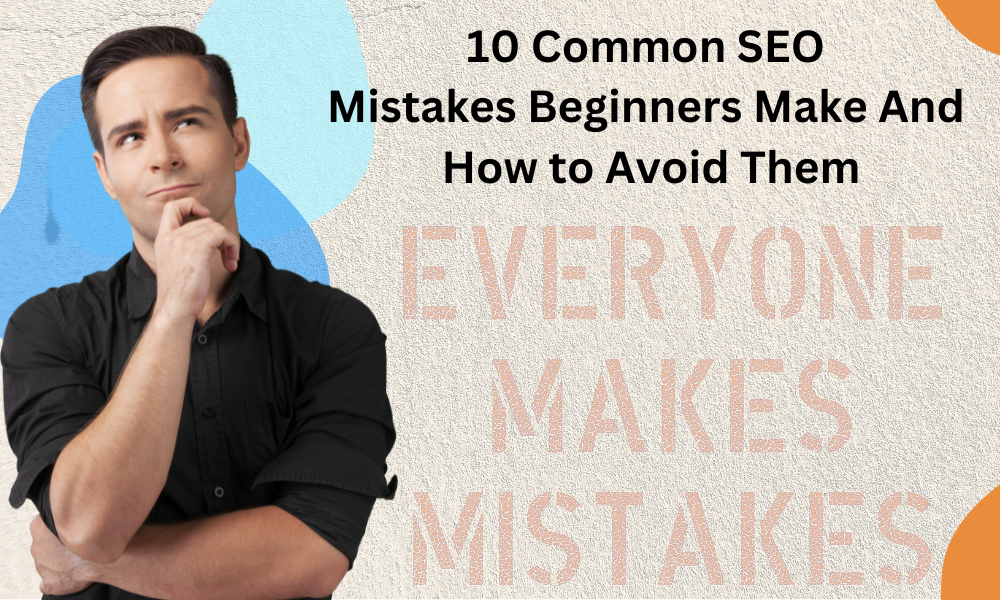Search Engine Optimization (SEO) is a critical component of digital marketing, but it’s easy to make mistakes, especially if you’re just starting out. Even small errors can have a big impact on your website’s visibility and rankings. To help you navigate the complexities of SEO, here are 10 common mistakes beginners make and how to avoid them.
1. Ignoring Keyword Research
One of the most typical SEO blunders is not completing adequate keyword research. Beginners frequently choose broad or irrelevant keywords, resulting in bad ranks and limited traffic.
How to Avoid It: Use tools like Google Keyword Planner, Ahrefs, or SEMrush to find keywords that are relevant to your niche, have decent search volume, and low competition. Focus on long-tail keywords, which are easier to rank for and often have higher intent.
2. Overlooking On-Page SEO
On-page SEO entails optimizing certain pages on your website. Beginners frequently overlook components like as meta titles, descriptions, headers, and internal linking.
How to Avoid It: Ensure every page has a unique, descriptive title tag and meta description. Use H1, H2, and H3 tags to structure your content logically. Also, link to other relevant pages on your site to improve navigation and SEO.
3. Neglecting Mobile Optimization
Having a mobile-friendly website is no longer optional, since mobile devices account for the vast majority of web traffic. Beginners frequently overlook to improve their websites for mobile consumers.
How to Avoid It: Use responsive design to ensure your site looks great on all devices. Test your site’s mobile-friendliness using Google’s Mobile-Friendly Test tool and fix any issues.
4. Ignoring Page Speed
Slow-loading websites annoy users and lower your rating. Beginners frequently ignore the necessity of maximizing page speed.
How to Avoid It: Compress images, enable browser caching, and minimize CSS and JavaScript files. Use tools like Google PageSpeed Insights to identify and fix speed-related issues.
5. Duplicate Content
Publishing duplicate content might confuse search engines and lower your score. Beginners can unintentionally create duplicate content by copying from others or failing to use canonical tags.
How to Avoid It: Always create original content. If you must use similar content on multiple pages, use canonical tags to indicate the preferred version to search engines.
6. Ignoring Technical SEO
Technical SEO entails enhancing the backbone of your website. Beginners frequently overlook issues such as broken links, crawl errors, and incorrect redirections.
How to Avoid It: Regularly audit your site using tools like Screaming Frog or Google Search Console to identify and fix technical issues. Ensure your site has a clean URL structure and a working XML sitemap.
7. Overloading Content with Keywords
Keyword stuffing, or utilizing too many keywords in your text, is a common mistake that can result in search engine penalties.
How to Avoid It: Focus on creating high-quality, natural-sounding content. Use keywords strategically, but don’t force them into every sentence. Aim for a keyword density of 1-2%.
8. Neglecting Backlinks
Backlinks are an important ranking element, but beginners frequently misunderstand their significance or employ spammy approaches to obtain them.
How to Avoid It: Focus on earning high-quality backlinks from reputable websites. Create valuable content that others want to link to, and consider outreach strategies like guest blogging.
9. Ignoring Analytics
Without tracking your performance, you won’t know what works and what doesn’t. Beginners frequently fail to set up and monitor analytics.
How to Avoid It: Use tools like Google Analytics and Google Search Console to track your traffic, rankings, and user behavior. Regularly review your data to identify areas for improvement.
10. Expecting Overnight Results
SEO is a long-term approach, yet beginners frequently expect immediate results and quit too soon.
How to Avoid It: Be patient and consistent. SEO takes time, but the effort you put in will pay off in the form of sustainable, organic traffic. Focus on continuous improvement and stay updated with SEO trends.
Final Thoughts
SEO can be difficult, especially for novices, but avoiding these typical pitfalls will put you on the right track. Remember that SEO is a continuous process that involves patience, learning, and adaptability. By focusing on best practices and being educated, you may significantly improve the visibility and rankings of your website.
What SEO mistakes have you made, and how have you corrected them? Please share your experiences in the comments below!
 seolounge
seolounge




